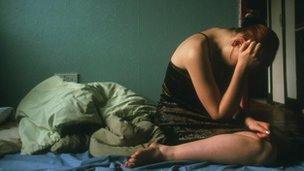Glasgow health board to help medics spot 'sex slaves'
- Published

Medics will be given advice on spotting signs of physical or emotional abuse
Frontline staff at Scotland's largest health board are to given advice on how to spot victims of human trafficking.
NHS Greater Glasgow and Clyde will issue guidance on how to identify tell-tale signs that a patient may be "trapped in sexual slavery".
Doctors and nurses will be told to look for physical or psychological abuse in suspected victims and ascertain whether companions are in fact "minders".
Police estimate that Scotland has 13.5% of the UK's trade in humans.
Sharon Doherty, a consultant clinical psychologist at NHS Greater Glasgow and Clyde (GGC), provides mental health care to victims of human trafficking.
'Domestic servitude'
She said: "Trafficked men and women can be trapped in sexual slavery and forced labour or domestic servitude here in Glasgow, in some cases held captive for many years in a locked single room.
"Anything health staff can do to identify victims of trafficking and make it difficult for traffickers to use the UK as a destination is vital."
Signs that someone could have been subjected to this could include injuries or scarring from assaults, signs of rape or sexual abuse or post-traumatic stress and psychological disorders.
Victims could also be accompanied by a minder, who they defer to and who speaks for them. They may also appear nervous and be unwilling to volunteer questions.
Dr Doherty added: "Trafficking does exist in Glasgow and traffickers have been able to use the fact that health professionals and other agencies may not be fully aware of the issue.
"By increasing awareness amongst health staff about this issue, I think it will make it increasingly difficult for traffickers to use the UK as a destination."
Catriona Renfrew, director of corporate planning and policy at NHS GGC, said: "Human trafficking is a very real problem in the west of Scotland with gangs or individuals tricking men and women to enter this country with false promises of work, only to end up as modern day slaves, or coercing them into prostitution.
"Trafficking exists in Scotland and contact with a health worker may be the one chance for a trafficked person to get help and protection.
"This is a cruel trade in human lives and staff can play an important role by picking up on injuries or behaviour and help people contact the police or other appropriate authorities and services."
- Published28 November 2011
- Published14 March 2011